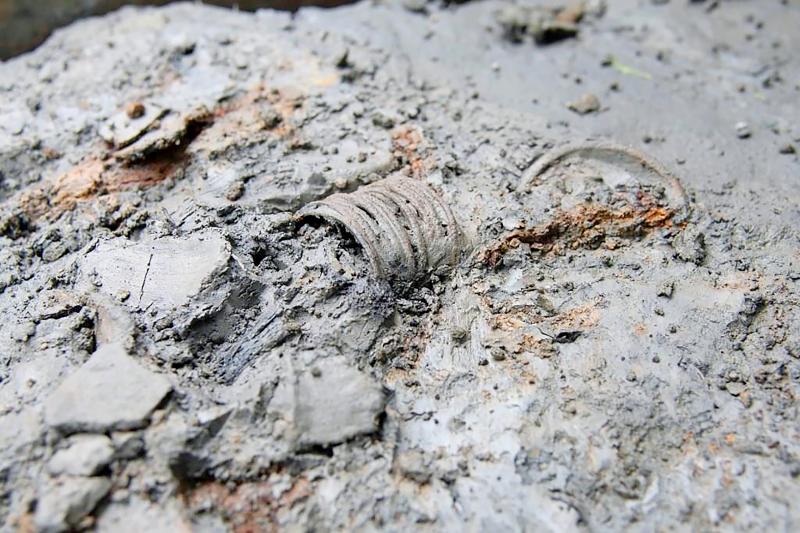Three human skeletons and artifacts believed to be about 400 years old were unearthed by construction workers at National Ilan University in Yilan County, the university said yesterday.
The discoveries were made on May 10 as workers were digging to expand the College of Electronic Engineering and Computer Science’s facilities, the university said in a statement.
The skeletons were found at three sites, along with glass beads, copper bells and rings, discs and a fish-shaped metal knot, it said.

Photo courtesy of National Ilan University via CNA
The find is likely connected to the “Old Baili Village” (擺厘舊社, Bai Li Jiu She), an as-yet-undiscovered Kavalan settlement that has been mentioned in written and oral sources, it said.
It is not the first time that objects of archeological value were found on the university’s campus, it said.
A trove of artifacts linked to the Shihsanhang (十 三行) settlement was discovered when ground was broken for the school in 1926, while seven skeletons, three fish-shaped metal knots and other trinkets were separately unearthed by construction workers in 2000 and 2006, the university said.
The fish-shaped knots are deemed to be particularly interesting to archeologists, it added.
The university has great respect for the archeological sites on campus and maintains a permanent exhibition titled “Ilan Agricultural School Ruins Cultural Layer,” the university said.
A NT$9 million (US$302,928) social responsibility budget has been set aside by the university to excavate and preserve the sites, it said, adding that a museum is also being planned.
However, rising inflation has made those projects difficult to accomplish without aid from the government, the university said, calling for public funding.

An essay competition jointly organized by a local writing society and a publisher affiliated with the Chinese Communist Party (CCP) might have contravened the Act Governing Relations Between the People of the Taiwan Area and the Mainland Area (臺灣地區與大陸地區人民關係條例), the Mainland Affairs Council (MAC) said on Thursday. “In this case, the partner organization is clearly an agency under the CCP’s Fujian Provincial Committee,” MAC Deputy Minister and spokesperson Liang Wen-chieh (梁文傑) said at a news briefing in Taipei. “It also involves bringing Taiwanese students to China with all-expenses-paid arrangements to attend award ceremonies and camps,” Liang said. Those two “characteristics” are typically sufficient

A magnitude 5.9 earthquake that struck about 33km off the coast of Hualien City was the "main shock" in a series of quakes in the area, with aftershocks expected over the next three days, the Central Weather Administration (CWA) said yesterday. Prior to the magnitude 5.9 quake shaking most of Taiwan at 6:53pm yesterday, six other earthquakes stronger than a magnitude of 4, starting with a magnitude 5.5 quake at 6:09pm, occurred in the area. CWA Seismological Center Director Wu Chien-fu (吳健富) confirmed that the quakes were all part of the same series and that the magnitude 5.5 temblor was

The brilliant blue waters, thick foliage and bucolic atmosphere on this seemingly idyllic archipelago deep in the Pacific Ocean belie the key role it now plays in a titanic geopolitical struggle. Palau is again on the front line as China, and the US and its allies prepare their forces in an intensifying contest for control over the Asia-Pacific region. The democratic nation of just 17,000 people hosts US-controlled airstrips and soon-to-be-completed radar installations that the US military describes as “critical” to monitoring vast swathes of water and airspace. It is also a key piece of the second island chain, a string of

The Central Weather Administration has issued a heat alert for southeastern Taiwan, warning of temperatures as high as 36°C today, while alerting some coastal areas of strong winds later in the day. Kaohsiung’s Neimen District (內門) and Pingtung County’s Neipu Township (內埔) are under an orange heat alert, which warns of temperatures as high as 36°C for three consecutive days, the CWA said, citing southwest winds. The heat would also extend to Tainan’s Nansi (楠西) and Yujing (玉井) districts, as well as Pingtung’s Gaoshu (高樹), Yanpu (鹽埔) and Majia (瑪家) townships, it said, forecasting highs of up to 36°C in those areas